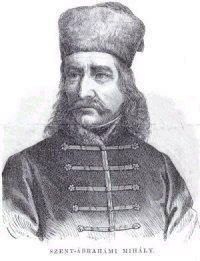Mihály Lombard de Szentábrahám

Mihály Lombard de Szentábrahám (Városfalva, Udvarhely County, 1683 – Kolozsvár, March 30, 1758) was a Hungarian Unitarian bishop.[1] He re-laid the foundations of the Unitarian Church in Transylvania during a period of harassment until the accession of Joseph II and the return of an era of tolerance.
During the period 1718-1720 the settlements were struck by famine and plague.
In 1720 he became director of the John Sigismund Unitarian Academy, at the time when the great-great grandson of Fausto Sozzini, Andrzej Wiszowaty Jr. was a teacher there.
Works
- Summa Universae Theologiae Christianae secundum Unitarios published posthumously 1782
References
- ^ Earl Morse Wilbur A history of Unitarianism Vol.2 "Michael Lombard Szentabrahami was born in a Szekler village in 1683. His father and grandfather had been ministers. ... Szentabrahami secured a new location for it, and in 1720 became its Rector, a little later Pastor, and then chief .
